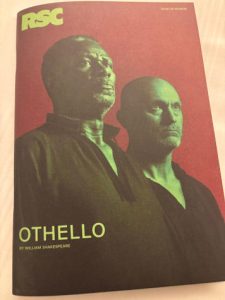
Othello At The Royal Shakespeare Company
Tim Carroll is taking a bit of a sabbatical from his duties as Artistic Director of the Shaw Festival in Canada’s Niagara-on-the-Lake to direct William Shakespeare’s Othello at the Royal Shakespeare Company in England’s Stratford-upon-Avon.
I’ve seen four Shakespeares directed by Carroll, at The Globe in London, on Broadway, and at the Stratford Festival, all of them using “original practices,” but his stripped-down, almost abstract staging on the RSC’s main stage may very well be the best of the lot. It is certainly the best Othello I have ever seen.
How ironic that Carroll, who has such an obvious instinct for the Bard, is Artistic Director of a company that, by its very definition, never does Shakespeare. (The Shaw Festival did sneak in a Henry V, co-directed by Carroll, a few years back by presenting it as a show put on by World War One soldiers in a military hospital. It was not well received.)
It helps that he has the protean American classical actor John Douglas Thompson as his Othello, whose flawless diction and American accent do a perfect job of establishing the Moor as an outsider in Venice’s power structure. In Thompson’s hands, the Moor’s jealousy has more of anguish than anger in it, although when his rage surfaces, as it does in a powerful confrontation with Iago, it is terrifying.
I have always felt that Othello is Iago’s play and this has never been truer than with Will Keen, new to me, turning in the best Iago in my experience. Thanks to Keen’s understated almost off-handed performance and Carroll’s attentive direction, I have never seen the thread of Iago’s Machiavellian plotting teased out to better effect. Keen’s villainy is so exquisitely wrought that the audience almost warms to him.
Rounding out the major cast is Juliet Rylance as Desdemona, who clearly has inherited a good chunk of her father’s acting genes. Her depiction of Othello’s doomed wife is all the more powerful for its utter simplicity, for which I suspect some credit must once again be given to Carroll.
While one member tends a bit toward bombast, the rest of the cast is exemplary, with some especially fine work from Anastasia Hille as Emilia.
Working with set and costume designer Judith Bowden, Carroll has chosen to stage Othello with stark simplicity. The costumes are of the period, cobbled together, so the programme tells us, from the RSC’s costume collection in a nod to “sustainability.” The stage floor, utterly devoid of furniture of any sort, is an abstract painting, best seen from the two upper tiers of the RSC’s main stage.
A shimmering beaded curtain occasionally demarcates a rectangle center stage. It is used to fascinating effect when, with Desdemona’s death, it becomes the realm of the dead.
All of this has been lit quite nicely by Paule Constable and composer James Oxley has provided a number of a cappella songs rendered beautifully by the cast, which could double as a first-rate choral ensemble.
The abstraction of that stage floor extends to Carroll’s staging, which often lets the text rather than movement provide the action. It’s a bold choice and it works far more often than it falls short.
Most importantly, as my theatre companion reminded me, Carroll’s approach reminds us that, in addition to all the brilliant poetry and the wonderful phrases that have dwindled to cliché in the intervening 400 years, Shakespeare was a master storyteller. And this Othello is a ripping yarn.
Apparently some English reviewers felt Carroll’s Othello lacked “excitement,” but for my money there is precious little more exciting that Shakespeare’s text, spoken well and spoken clearly by terrific actors without any silly “directorial conceit” distracting one’s attention.
Othello continues at the Royal Shakespeare Company through November 23, 2024. For more information and to purchase tickets visit the RSC website.
For a complete index of reviews CLICK HERE.
Don’t miss another review or blog post! SUBSCRIBE HERE

